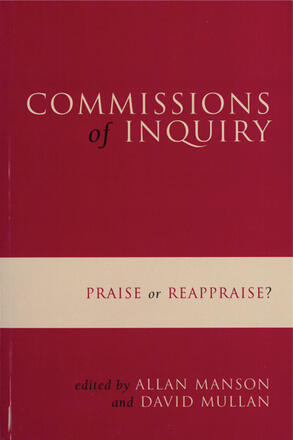
Commissions of Inquiry
Praise or Reappraise?
La description
Commissions of inquiry have had a significant role in the development of public policy in Canada. Historically, Canadian governments have relied on these bodies to consider broad matters of national importance, and the recommendations from these commissions have sometimes led to profound changes in the way in which we are governed. Recently commissions have been used to examine specific events such as the deployment of troops in Somalia, or contaminated water in Walkerton, as well as broader policy issues such as the future Canada’s public health system. As instruments for both ensuring public accountability and reforming public policy, commissions of inquiry have become an ingrained part of our traditions of governance.
This timely and important volume brings together leading academics and practitioners, former commissioners, and international observers in an assessment of the role and conduct of commissions of inquiry in Canada. It provides a comprehensive source of legal doctrine in relation to commissions of inquiry and it also brings a political science perspective to the function and pathology of this kind of investigative and policy-making instrument. The discussion of specific inquiries includes both criticisms and recommendations for improvement.
The book will appeal to members of the public who want to know more about this often controversial public vehicle; journalists, political theorists, and legal scholars who have become observers, fans, or critics of inquiries; and those officials who find themselves involved in the operation of an inquiry. These authors’ insights will be of particular value to those engaged in structuring and undertaking an inquiry, as well as to those individuals and agencies who find themselves within the scrutiny of a commission of inquiry.
The book has its origins in a conference held in Kingston, Ontario in 1999, sponsored by the Law Commission of Canada. The editors and the publisher gratefully acknowledge the Commission’s support.